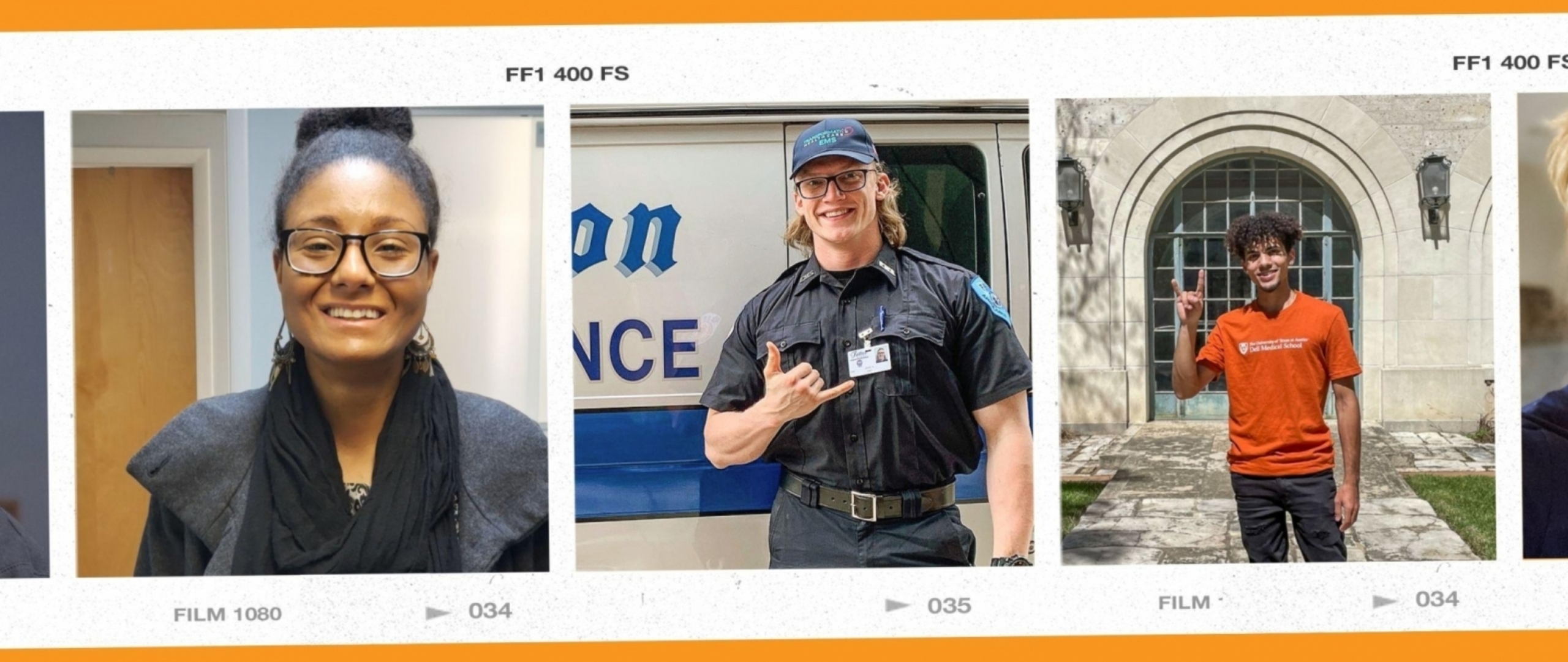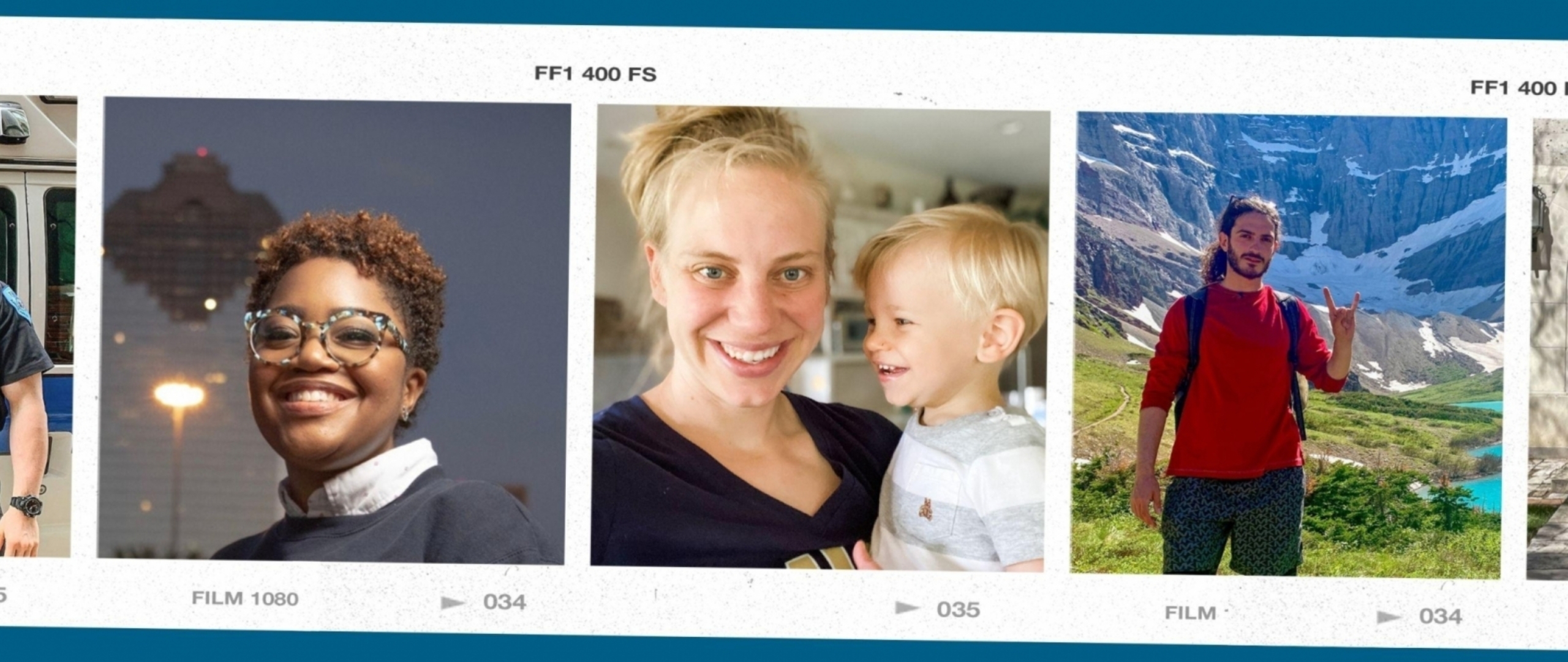The Class of 2025 is the newest cohort of medical students ready to carry forward Dell Med’s mission to revolutionize the way people get and stay healthy, in Central Texas and beyond.
The 50 students, ranging in age from 21 to 32, come from near and far — though 96% are Texas residents upon matriculating — and their backgrounds vary from the traditional pre-med track to the Marines to emergency medical service and more.
Meet six of them here.

A Tireless Advocate
Name: Aquiel Warner
Hometown: Pflugerville, Texas
Education: Yale University: B.S., Astrophysics and Evolutionary Biology
Having worked at a federally qualified health center, a private hospice and as a refugee resettlement case manager — and having experienced barriers to care herself — Aquiel Warner has witnessed how access to care can change a person’s life. “I am a tireless advocate of ensuring everyone, regardless of their background, receives the health care they deserve,” Warner says.
What’s one thing you think needs to be tackled to make Austin communities healthier?
Mental health. The more tools and resilience individuals develop to cope with whatever obstacles come their way, the healthier we will be as a society. I credit many of the critical issues of today to a very real feeling of loss of control and a lack of agency, and if the repeating events of the past century have taught me anything, it’s that change rarely happens overnight. Therefore, I believe it is crucial to ensure individuals know when to reach out and can easily access behavioral health care that meets them where they are, without judgment or assumptions.
Why Dell Medical School?
I worked years in case management interacting with caring and thoughtful medical providers trained under the standard model of medicine, and yet I still devoted most of my time to bridging the gap between that caring provider and the realities of my clients’ lives. I wanted an education that understood health care is more than medical care.
A Champion for Health Literacy
Name: Zane Cooke
Education: University of Connecticut: B.S. and M.S., Biomedical Engineering
Zane Cooke has been all over the world: Born in Yokosuka, Japan, Cooke moved often due to his father’s Navy career, spending the last decade in New England before joining Dell Medical School. Cooke has served in numerous health professions already, and counts health literacy as an issue that’s close to his heart — noting the benefits of helping individuals be stewards and advocates for their own health.
What motivates you?
I feel I am at my best and most motivated when I am working to serve patients and their health needs with compassion and empathy. From volunteering at a community clinic in Zambia to working as an EMT in Boston during the COVID-19 pandemic, hands-on medical work lets me know that I am able to make a genuine difference, even if only in the life of one person at a time. I am driven to pursue a career in medicine to expand my ability to provide care, treat and support my fellow humans.
Who’s your hero?
One of many is Carl Sagan, largely for the sense of wonder and love with which he approached every topic. His way of seeing the world — “The nitrogen in our DNA, the calcium in our teeth, the iron in our blood, the carbon in our apple pies were made in the interiors of collapsing stars. We are made of starstuff.” — is humbling, and reminds me of my place in the world, both in relation to the cosmos and my fellow humans.
From Hardship, A Commitment to Service
Name: Arhian Albis Ramos
Hometown: Bayamo, Cuba
Education: The University of Texas at Austin: BSA, Biochemistry
Learning to start over in not one, but two new countries — first Mexico, and then the U.S. — Arhian Albis Ramos understands the difficulties immigrant communities face. Now a proud Texan, Ramos is eager to serve his community as a physician.
Who’s your hero?
My mother. When my father passed away, she overcame that and continued raising me to the best of her ability. She made the brave decision to leave Cuba — and everything we ever knew — in search of a better future for both of us. She was a teacher back in Cuba and has a bachelor’s degree, but when we arrived in the U.S, she did not hesitate to take any low-wage jobs she could find and work long hours and nightshifts to ensure I had everything I needed to focus and succeed in school. For all that and much more, my mom is not only my hero. She is also my inspiration.
Why Dell Medical School?
Being part of the immigrant community in Austin and coming from a working-class household, I always noticed some of the hardships my peers and their families experienced, and some of these I experienced myself. The biggest reason I chose Dell Med is because of their commitment to improving the health of the Austin community overall, and to finding ways to better the health of underserved and vulnerable Austin communities such as the one I come from.

Challenging the Status Quo
Name: Lundyn Davis
Hometown: Houston, Texas
Education: Howard University: B.A., Sociology | Columbia University: M.S., Bioethics
Lundyn Davis isn’t interested in a conventional path to medicine — nor in upholding a traditional health care system that doesn’t work for everyone. As she says, “It’s one thing to be taught the status quo while hoping to change it later; it is another thing entirely to be taught to be disruptive.”
What were the key steps in your journey to med school?
In 2003, I was diagnosed with Type 1 diabetes, so I was introduced to the health care system very young. From my diagnosis at age 6 to my entering medical school at 24, I witnessed the unfortunate paradox of living in a city with an unparalleled medical center, yet seeing so many of that city’s residents without access to it. Medicine gives me the opportunity to help someone on an individual level and truly have an impact on their life while also being able to aid the community they call home.
Who’s your hero?
Dr. Patricia H. Williams, the founder and head of The Imani School in Houston, Texas. The Imani School, which was established in 1988, has grown into one of the largest independent, private, predominantly African American schools in the nation. I truly revere Dr. Williams’ vision to establish an institution in which African American children, during their most formative years, are nurtured and cultivated in an environment in which they are represented in everyone from their principal and administrators, to their teachers and peers.
Teammate, Marine, Mother & — Soon — Doctor
Name: KC Koepp
Hometown: Vienna, Virginia
Education: United States Naval Academy: B.S., Chemistry | University of North Texas Health Science Center: M.S., Medical Science
KC Koepp knows the meaning of hard work and the importance of collaboration. A longtime athlete, a Marine, a mother and more, she’s ready for leadership in her next chapter: a physician aiming to transform health care to better serve all.
What were the key steps in your journey that made you who you are today?
I knew I wanted to be a doctor in high school when I spent two weeks shadowing a Los Angeles ER physician. Everything about it was captivating: the action, the diversity of medical issues, the problem solving and the raw humanity.
Later on, the Marine Corps put my character in motion through leadership. There is nothing more humbling than to have the lives, hopes and dreams of other humans in your hands. Every day I worked to be worthy of the Marines, to live the standard and to advance the mission. And when I became a mother, I learned the burden and awesome privilege of being wholly responsible to and for another human. These things and more, in aggregate, have made me the woman I am today.
What’s your motto?
There’s always a solution.
Driven to Succeed
Name: Karim Baho
Hometown: Damascus, Syria
Education: The University of Texas at San Antonio: B.S., Public Health
Karim Baho is driven by what he calls “the immigrant mentality,” which he describes as one of hard work, dedication, discipline, ambition and eagerness to succeed — incidentally, also qualities of Baho’s hero: his mother, a cardiologist practicing in his hometown of Damascus.
If you could cure one disease, which one would you choose and why?
Cancer. Unlike many other diseases, cancer is not easily prevented, and many perfectly healthy people develop it out of nowhere.
What do you love about Austin?
I love the diversity in Austin and the fact that there is something for everyone here. Medically speaking, Austin has a large underserved and diverse population which will allow me to serve in treating many types of medical cases and public health challenges. And outside of medicine, Austin is home for so many cultures as well as music, art, food and outdoor attractions.
Even though I was not born in Texas, I have built such a great connection with this state. This is my new home, especially since my family lives here now. I want to stay in Texas — close to my family — and would love to practice medicine while giving back to this state.